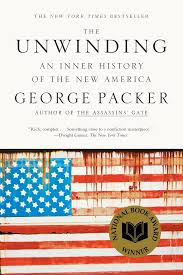Unwinding and Dos Passos
Does anyone read John Dos Passos today? Way back when I was an English major in the early 1980s, I studied him along with many of the other major American authors from the first half of the twentieth century. His novels after World War I – and before World War II – were political. The U.S.A. trilogy was an attempt to capture the scope of America, good and bad, with a message for liberal/socialist values. Dos Passos wanted greater economic justice, and to elevate the hopes, dignity and needs of the “common man.”
It is very good literature. The short takes, narrative devices, and splintered perspectives of the three U.S.A. novels create a modernist masterpiece. It is not nonfiction, but there’s a truth to it that makes for good conversation and scholarship.
The U.S.A. trilogy figured prominently in the creation of journalist George Packer’s award-winning book, The Unwinding. Published in 2013, it is collection of carefully crafted biographical sketches. Some are short while others are long-form journalism. Taken collectively, they paint a picture of an America economy and culture abandoning its fundamental tenets of decency, hard work, and individual values. There many struggles in The Unwinding, a litany of failed dreams and broken promises. There are few heroes, many victims, and a few who came out on top financially. There is little holding the center of the narrative together.
I picked up the book to see if it could provide more insight into today’s political crisis and conflicts. Unfortunately, it did not offer much new. The stories are variations on a theme that we have read again and again. The book does, however, offer a framework of justification. It gives voice to frustration, restlessness and rootlessness, and people whose lives are disrupted by an indifferent economy. Traditional anchors are in short supply.
The challenge with the book is that Packer does not offer much by explanation. He does not suggest or propose. He describes – and does so ably, as one might expect from a New Yorker writer. But read as a work of nonfiction, more is needed here. We do not need description of the missing center. We are rich in accounts of our failings and our decline. Instead, we need to better understand what has left us, why it no longer resonates, and whether or not we can do anything meaningful to re-establish some core values. Dos Passos, from the vantage point of the novelist, is clear about his values. Like him or not, he is clearly making an argument.
If we are to look backward, I expect more substance. If we are to look forward, I require data and arguments. The Unwinding, even with its lyrical observations, did not provide enough of either. Despite the book’s broad scope and close observations, it is an opportunity not fully realized.
David Potash